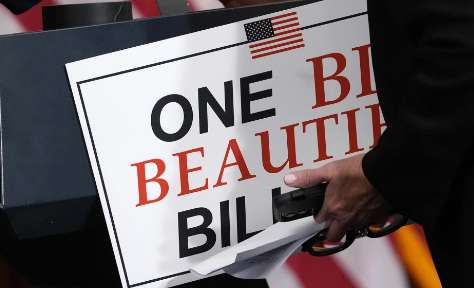Fossil Fuel Industry Is Expected To Be The Biggest Winner As The 'Big, Beautiful Bill' Passes The House In Narrow Vote
President Trumps sweeping tax and spending bill passed in the House on Thursday, marking a significant victory in advancing his broad domestic policy agenda. Dubbed the "Big, Beautiful Bill" by Trump,

President Trump's sweeping tax and spending bill passed in the House on Thursday, marking a significant victory in advancing his broad domestic policy agenda. Dubbed the "Big, Beautiful Bill" by Trump, this legislative package has now been sent to the president for signing and will officially become law.
The final vote tally was 218 in favor and 214 against, with Kentucky Republican Thomas Massie and Pennsylvania Republican Brian Fitzpatrick joining all House Democrats in opposing the bill.
The legislation includes trillions of dollars in tax cuts and funding for enhanced immigration enforcement, alongside substantial reductions to Medicaid and other social welfare programs. While some Republican lawmakers expressed concerns about the bill potentially exacerbating the U.S. fiscal deficit, GOP leadership remained confident in its passage.
The bill terminates long-standing support for solar and wind energy while creating a favorable environment for oil, gas, and coal production. Trump has made his energy priorities clear. Oil, gas, and coal emerge as winners. The law opens federal lands and waters to oil and gas drilling, mandating 30 lease sales in the Gulf of Mexico over 15 years, more than 30 lease sales annually across nine states, and granting the industry access to Alaska. It also reduces royalties paid to the government by producers extracting oil and gas from federal lands. Additionally, the bill phases out clean electricity investment and production tax credits for wind and solar, with projects commissioned after 2027 no longer eligible for these incentives.
During a critical procedural vote on Wednesday night, five Republican lawmakers initially opposed the bill, delaying the process for several hours. However, after late-night negotiations, four of them reversed their positions, allowing the motion to pass around 3:30 AM Eastern Time.
Reports indicate that House Speaker Johnson and Trump personally applied intense pressure on the dissenters. Trump had repeatedly urged Congressional Republicans to deliver the bill for his signature by July 4, Independence Day.
The bill narrowly cleared the Senate two days earlier, passing 51-50. With Republicans holding only a slim majority in the Senate, Vice President Vance cast the tie-breaking vote.
Democrats unanimously opposed the bill, criticizing it as primarily benefiting the wealthy while depriving millions of low-income Americans of health insurance. House Minority Leader Hakeem Jeffries of New York launched a scathing critique of Republicans before the vote, delivering an eight-hour-and-forty-four-minute speech that set a new record for the longest House floor speech in history. The previous record was set in 2021 by then-Minority Leader Kevin McCarthy.
During his address, Jeffries accused Republicans of "trying to take a chain saw to Social Security, a chain saw to Medicare, a chain saw to Medicaid, a chain saw to the health care of the American people, a chain saw to nutritional assistance for hungry children, a chain saw to farm country and a chain saw to vulnerable Americans," After concluding his speech, Jeffries told reporters, house Democrats will continue to "press on for the left behind."
Republicans countered that the Medicaid reforms in the bill aim to reduce waste, fraud, and abuse while introducing new work requirements for eligibility. As of March this year, over 71 million Americans were enrolled in Medicaid.
However, the Congressional Budget Office (CBO) warned that the bill could add $3.4 trillion to the national debt over the next decade, with current federal debt already standing at $36.2 trillion. The White House disputed the CBO's assessment, accusing the agency of "partisan bias."
Notably, this massive bill arrives as the U.S. faces broader economic volatility. The Trump administration is advancing a trade protectionist policy, planning to reimpose "reciprocal" tariffs on most major trading partners starting July 9, potentially triggering significant shifts in global trade dynamics.
Disclaimer: The views in this article are from the original Creator and do not represent the views or position of Hawk Insight. The content of the article is for reference, communication and learning only, and does not constitute investment advice. If it involves copyright issues, please contact us for deletion.